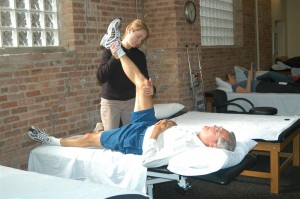When considering orthopedic surgery, if you do not know where to begin in choosing a physician, talking with your physical therapist is always a good place to start since they work with doctors from various practices or hospital systems and can often provide an informed opinion. In this day and age, you can also do a Google search to learn more. Some people like to go to Healthgrades (or similar site) or Yelp. Personally, I am a paid subscriber to Angie’s List. In Chicagoland, they have a health and wellness section in addition to their home section, and I find their site helpful for getting qualified reviews from regular people. From my perspective, constructive reviews help me to make a more informed decision.
 Staying on the topic of orthopedic surgery, and more specifically elective total joint replacement, prehab is commonly ordered by a physician. Prehab is exactly what it sounds like: attending physical therapy PRIOR to the surgical event. Consumers often ask “Why would I want to go to therapy prior to surgery?” The answer is actually pretty straightforward. Most people choosing an elective joint replacement have had a boney degenerative process that has been going on for a long time. On top of probable arthritic joint changes, pain is also a typical complaint. Research from Hodges and Tucker, Pain: 2011 shows people move differently when in pain. If you are moving differently, in many instances you are also losing motion/flexibility, strength, and possibly even cardiovascular stamina. When you go into surgery, the condition you are currently in can have a big impact on your outcome. In other words, if you can maximize range of motion, strength, and cardiovascular function prior to surgery, you are likely to recover more quickly and have a better long-term outcome.
Staying on the topic of orthopedic surgery, and more specifically elective total joint replacement, prehab is commonly ordered by a physician. Prehab is exactly what it sounds like: attending physical therapy PRIOR to the surgical event. Consumers often ask “Why would I want to go to therapy prior to surgery?” The answer is actually pretty straightforward. Most people choosing an elective joint replacement have had a boney degenerative process that has been going on for a long time. On top of probable arthritic joint changes, pain is also a typical complaint. Research from Hodges and Tucker, Pain: 2011 shows people move differently when in pain. If you are moving differently, in many instances you are also losing motion/flexibility, strength, and possibly even cardiovascular stamina. When you go into surgery, the condition you are currently in can have a big impact on your outcome. In other words, if you can maximize range of motion, strength, and cardiovascular function prior to surgery, you are likely to recover more quickly and have a better long-term outcome.
Some things to consider with prehab:
- Prehab is usually not as long or as frequent as post-surgical therapy. In many cases, the physician may recommend that you be seen only once or twice to receive education on a home program you can perform independently while awaiting surgery.
- Understand your insurance benefits. Check to see if you have a dollar maximum for physical therapy or a limited number of visits per condition. If so, you will want to limit your prehab in order to ensure that you have enough post-surgical visits to achieve your functional goals.
- There is a cost to physical therapy whether it is pre- or post-surgical, so be sure to explain any financial limitations to your therapist so they can plan your visits accordingly and help minimize your total out-of-pocket expenses.
- Remember, therapy is a team effort and it requires commitment on your part. Whether it is prehab or post-surgical rehab, you need to put in the effort to achieve the desired results. Make sure you take an active role in your recovery.
If you have any questions regarding prehab, please drop us a comment below and we will do our best to provide a response. Otherwise, here’s to an easy, quick, uncomplicated, and effective post-surgical recovery. Good luck!
Lori Diamos was a physical therapist at Athletico Physical Therapy at the time of this blog.


2 Comments
Jordan Bowman
Great stuff! I wish all of our patients did prehab. Post-op would be so much better for them.
Lori Diamos
Jordan, thanks for the reply and I couldn’t agree more. Early intervention and education really help a client to better understand how the prescribed prehab will benefit them so not only are they more informed but usually a lot more engaged and compliant with therapy activities improving those post surgical outcomes.